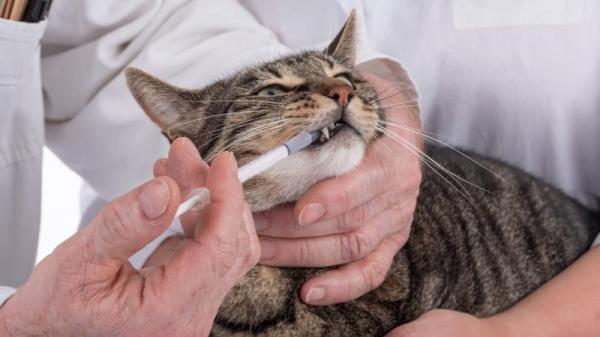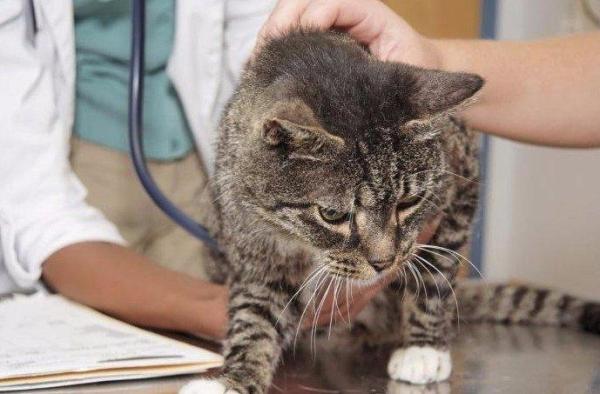
Meloxicam, marketed under the brand names Metacam®, Loxicom®, OroCAM®, and Rheumocam, is a nonsteroidal anti-inflammatory drug commonly used in veterinary medicine to treat pain and inflammation associated with rheumatic diseases and osteoarthritis. In some cases, it is also used to treat pain associated with surgery.
This AnimalWised article explains what meloxicam is used for, how it is dosed, and its side effects.
What is meloxicam used for in cats?
Meloxicam is a non-steroidal anti-inflammatory drug (NSAID) with anti-inflammatory, analgesic, and antipyretic effects, meaning it helps reduce inflammation, pain, and fever. It is usually prescribed to cats to fight inflammation and acute or chronic pain, usually due to musculoskeletal problems.
The drug works by helping to reduce the influence of hormones that can cause pain in a cat.
Keep in mind that many medications are often prescribed as off-label uses in veterinary medicine. In these cases, follow your veterinarian's instructions and precautions very carefully.
Cats are masters in the art of disguising signs of pain. Therefore, it is difficult to tell when they are suffering. Read this other article to learn how to tell if your cat is in pain.

How do I give meloxicam to my cat?
Meloxicam is available for dogs as oral liquid, oral spray, or chewable tablets, but for cats only as oral liquid or injection.
Be sure to shake the bottle well before administering the medication to your cat. Your veterinarian will give you detailed instructions on how to administer the medication. In general, however, it is always advisable to administer meloxicam together with food to reduce possible gastrointestinal side effects.
The initial dose, i.e. the dose we have to give to the cat on the first day of treatment, is 0.1 mg per kg of body weight. Later doses are halved to 0.05 mg per kg body weight. Measure the dose carefully according to the instructions of your veterinarian, because cats are very sensitive to overdose of this drug.
One of the advantages of meloxicam, apart from its ease of administration, is that it only needs to be given once a day. Therefore, the dosage is one dose every 24 hours.
The effect of the drug comes quickly, in about 1 to 2 hours, and the improvement of clinical symptoms should follow. Even if symptoms resolve early, it is imperative that you give your cat the entire medication unless your veterinarian advises you to stop.
Veterinarians will tell us how many days to extend the treatment and when to stop it, since sometimes it's best to reduce the dose gradually.
What happens if I miss a dose?
If you miss giving your pet a dose, give the next dose as soon as you remember, unless it is less than 12 hours before the next scheduled dose. If this is the case, you have two options:
- Skip the forgotten dose, give it at the next scheduled time, and continue with the regular dosing schedule.
- Give your cat the missed dose and then wait the recommended time period before giving the next dose (continue with regular dosing at the new time).
Never give your pet two doses at once or an extra dose.
Side effects of meloxicam in cats
The most common adverse effects this drug may cause in cats are gastrointestinal symptoms such as vomiting, diarrhea, and loss of appetite. Other symptoms include:
- Change in bowel movements (black, tarry or bloody stools or diarrhea).
- Changes in behavior (increased or decreased activity, incoordination, seizures, or aggression).
- Jaundice (yellowing of the gums, skin, or whites of the eyes).
- Increased urination or changes in urination (frequency, color, or odor)
- skin irritation (redness, scabbing, or scratching)
- Stomach ulcers
- Unexpected weight loss
The effects of this moderate-release medication should stop after a few days, although the effects may last longer in animals with liver or kidney disease. Most symptoms usually subside by the end of treatment. It is important to report any side effects you observe to your veterinarian.

Contraindications to meloxicam in cats
Meloxicam should be used with caution in cats. Meloxicam may cause kidney damage in cats with early, undiagnosed kidney disease depending on the dose prescribed. Your veterinarian will carefully weigh the pros and cons of treating your cat with meloxicam and may order a blood and urine test to check your cat's kidney function before prescribing meloxicam.
Meloxicam should also not be given to cats that have gastrointestinal, liver, or heart disease, or that are allergic to the active ingredient or any of the recipients.
In addition, it should not be administered to kittens less than 6 weeks of age or to dehydrated or hypotensive adult cats because renal function may be severely impaired. It is also not advisable in pregnant or lactating cats.
If your cat is already on medication and the veterinarian is not aware of this, we must inform the veterinarian as it may interact with other medications.
Kidney failure in cats is unfortunately a common condition in older cats. Read this other article to learn more about kidney failure in cats and their life expectancy.

This article is purely informative. AnimalWised does not have the authority to prescribe any veterinary treatment or create a diagnosis. We invite you to take your pet to the veterinarian if they are suffering from any condition or pain.
If you want to read similar articles to Meloxicam for Cats - Uses, Dosage, and Side Effects, we recommend you visit our Medicine category.